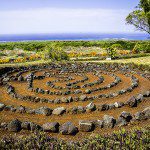 My spiritual coming of age happened against the backdrop of a loving, albeit quirky family–who cultivated their secular Judaism amidst South Carolina’s Bible Belt culture. The day I told my Dad that I had embraced Christianity, he said, “If you were younger, I could put you over my knee and spank you.” At thirty-seven, I had insulted my Jewish family and every generation preceding them. Remarkably, after thirty years of belief, I have assimilated Christian resolve with my personal identity and resumed a peripheral involvement in Jewish life.
My spiritual coming of age happened against the backdrop of a loving, albeit quirky family–who cultivated their secular Judaism amidst South Carolina’s Bible Belt culture. The day I told my Dad that I had embraced Christianity, he said, “If you were younger, I could put you over my knee and spank you.” At thirty-seven, I had insulted my Jewish family and every generation preceding them. Remarkably, after thirty years of belief, I have assimilated Christian resolve with my personal identity and resumed a peripheral involvement in Jewish life.
My shocking radical turn, the most practical decision of my life, entailed breaking away from the only reality I had ever known, the collective conversation of which I was a part. It forced me to let go of expectation, ego, and the conventional wisdom of a lifetime. From the inside, I see my epiphany as a seamless progression of values and disposition, but for my loved ones, it remains a complete anomaly.
During the time my faith was incubating, I experienced crushing anxiety due to conflict and indecision. Reflecting on how I came to resolve these doubts, I see a pattern of dissonance and renegotiation. I will always understand the Jewish sensibility—that of a minority group trying to protect itself. Paradoxically, as I contemplated leaving a civilization always on the edge of survival, pride in my identity became strengthened and chiseled, honed as if on a rough-edged stone. Without pretense, I can state that the Jewish mystique, with its timeless unfolding in the blood stream of history, is writ large upon my psyche.
Several years into my commitment phase, I began the practice of journaling. While rigorous and punishing, it helped me to process confusing thoughts and emotions. By retrieving and organizing my past, I can create order out of chaos and bring light to troubling events in my past.
As my religious identity shifted, writing, as a form of narrative therapy, helped me to move past psychic dissonance. By framing my story as a coherent whole, I connected my past, present, and future—drawing from ways I experienced and interpreted the world.
Despite having moved away from theological Judaism, it remained the dominant narrative in my life. I continued to align myself with an oppressed, marginalized culture because I want to witness, honor, and respect that part of me. My experience of anti-Semitism, for example, forged the character and resilience that define me today.
I continue to write so that I can better know what I feel and think about a matter. As a form of communication, writing resembles prayer. It reaches deep into my psyche and speaks to a subconscious part of my soul. On a recent morning, for example, as I looked out of my window, I noticed the difficulty of pinpointing the precise moment darkness turned into the light. In putting pen to paper, I realized how the stages of my life may have been discerned this way—after the fact, and then, only subtly.
This led to the insight that my conversion evolved, not from a single illumination, but from many incremental points of light. I realized that my resistance to faith wore down when I studied the Jewish roots of Christianity. By conceptualizing myself as a first-century Jewish believer, I could live in a world of my own understanding, apart from rigid cultural and religious stereotypes.
Yet, the very act of recording my memories and reflections caused me to second guess myself. I wondered to what extent penning a memoir signaled that I was taking myself too seriously. I also questioned to what extent I should trust my memory.
Annie Dillard suggested that the familiar aspects of our lives are so second nature that they seem “in our bones.” Wordsworth expressed the same in his line, “the world is too much with us.” With these thoughts in mind, I concluded that it was just as likely I could be taking myself for granted as taking myself too seriously. This realization caused me to develop a finely tuned sense of wonder about all things mundane—not only aspects of my life but ideas related to time, pain, and death that I had grown too accustomed to.
In his Reflections on the Psalms, C.S. Lewis pointed out why we are so surprised to encounter something as ordinary as the passage of time:
We are so little reconciled to time that we are even astonished at it. ‘How he’s grown!’ we exclaim, ‘How time flies!’ as though the universal form of our experience were, again and again a novelty. It is as strange as if a fish were repeatedly surprised at the wetness of water. And that would be strange indeed; unless of course the fish were destined to become, one day, a land animal.
An eternal, inbred sensor holding us to an awareness of timelessness causes this disparity. I see the same dynamic at play when I encounter a painful circumstance or death. When confronted with them, I ask, “Why me?” rather than, “Why not me?” The subliminal knowledge that my eternal destiny will be to escape both causes the disconnect.
Whether a blessing or a curse, humans have a clearly defined, unique ability to remember. The meaning of my life plays out in the trusted space between the truth known and the truth promised. It may escape me in the present, only to be understood later. Alice in The Looking Glass derided memory because it only worked backward. Too bad, she might say, that every understanding, even narrowly won, can only benefit the future.
The nineteenth-century French writer, Marcel Proust, predicted what modern neurology now confirms—that a long-term memory is often a reconstruction of the past rather than a replay of it. Yet, contrasting research suggests that a casual remembrance can have authentic meaning in a person’s long-range story. As I become more mindful of my cumulative memories, I saw them play out in a reliable coherent fashion.
Going back to a childhood home and seeing its reduced stature can have an uncanny, unsettling effect. Because the universality of this nostalgic trick implies a leveling of the playing field, I decided that if I continued to write, I had no choice but to trust my memory. With humor, I concur with Pip, in Great Expectations who said, “His goal was not so much, to tell the truth, but to tell exactly what he remembered.”
Special to Patheos from Gail Baker. Learn more about her memoir “A Congregation of One” at acongregationofone.com.













